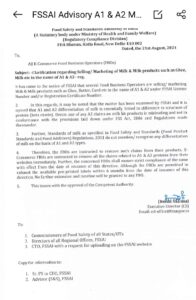Ban on A2 Label: A Severe Blow to Indian Dairy Farmers’ Dream of Competing Globally”
India is the world’s largest producer of milk, with a diverse dairy sector that supports millions of rural households. In recent years, A2 milk—derived from indigenous cow breeds such as Gir, Sahiwal, and Red Sindhi—has gained popularity due to its perceived health benefits over conventional A1 milk from exotic breeds like Holstein Friesian. However, a potential ban on using the “A2” label could significantly affect Indian dairy farmers’ prospects of entering and competing in global premium markets. Food and dairy companies are not allowed to claim A1 or A2 on milk or products.
What is A2 Milk?
A2 milk is produced by cows that naturally produce the A2 beta-casein protein, unlike most commercially bred cows that produce A1 beta-casein. Studies suggest that A2 milk is easier to digest and may reduce the risk of digestive discomfort compared to A1 milk. This has led to a growing demand for A2 milk, especially in international markets such as the U.S., Australia, and New Zealand.
Impact of the Ban on A2 Labeling
- Loss of Market Differentiation
- Without the A2 label, Indian farmers lose the ability to market their indigenous cow milk as a premium product.
- Consumers abroad will be unable to distinguish between regular milk and A2 milk, reducing India’s competitive edge globally.
- Reduced Export Potential
- Countries with high demand for A2 milk may turn to established exporters like Australia and New Zealand, bypassing Indian producers.
- The ban could limit India’s ability to tap into the growing global market for specialized, health-oriented dairy products.
- Economic Setback for Indigenous Breeds
- The demand for A2 milk has encouraged farmers to rear indigenous cattle breeds, which are more sustainable and adapted to local conditions.
- A ban could disincentivize farmers from maintaining native breeds, leading to a decline in their population and genetic diversity.
- Loss of Farmer Income
- Farmers producing A2 milk typically earn higher returns due to the premium price associated with its health benefits.
- Removing the A2 label would force farmers to sell their milk at standard market rates, impacting their income levels.
Arguments Behind the Ban
- Lack of Scientific Consensus: Authorities may argue that the health benefits of A2 milk over A1 are not conclusively proven by large-scale scientific studies.
- Consumer Confusion: Regulators fear that labeling could mislead consumers or create unnecessary segmentation in the market.
- Regulatory Challenges: Verifying and certifying milk as A2 requires significant investment in testing infrastructure, which could be challenging in India’s diverse dairy sector.
Suggested Measures to Counter the Ban
- Scientific Research and Validation
- Indian research institutions should conduct large-scale studies to validate the health claims associated with A2 milk.
- Collaboration with international research bodies can help establish global credibility.
- Certification and Quality Control
- The government can develop a robust certification system to verify genuine A2 milk, similar to organic certification.
- Standardized testing mechanisms across all dairy cooperatives would ensure fair labeling practices.
- Global Marketing and Branding
- Highlight the sustainability and cultural significance of indigenous Indian breeds in international marketing campaigns.
- Position Indian A2 milk as a premium product in global markets through government-led trade promotion initiatives.
- Support for Indigenous Breeds
- Provide subsidies, incentives, and support to farmers rearing indigenous cows to preserve genetic diversity.
- Strengthen existing initiatives like the National Kamdhenu Breeding Centre to promote native breeds.
Conclusion
The ban on the A2 label could have far-reaching consequences for India’s dairy sector, particularly for smallholder farmers who have invested in indigenous cattle breeds. Instead of imposing restrictions, regulatory authorities should focus on developing scientific validation frameworks, ensuring transparency, and promoting indigenous Indian milk products globally. Allowing the use of the A2 label, backed by robust certification, would empower Indian dairy farmers to compete effectively in the global market while preserving the nation’s rich cattle heritage.




